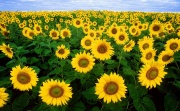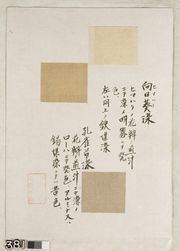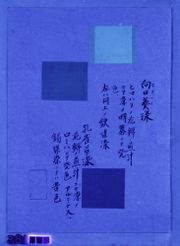Difference between revisions of "Sunflower dye"
Jump to navigation
Jump to search
| Line 5: | Line 5: | ||
== Synonyms and Related Terms == | == Synonyms and Related Terms == | ||
| − | [[File:Uemura 10-15-2009 381.jpg|thumb|silk dyed with sunflower petals | + | [[File:Uemura 10-15-2009 381.jpg|thumb|silk dyed with sunflower petals in Visible light]] |
''Helianthus annuus''; colorant à base de tournesol (Fr.); girasol (Esp.); | ''Helianthus annuus''; colorant à base de tournesol (Fr.); girasol (Esp.); | ||
| − | [[File:Uemura 10-15-2009 381 UV.jpg|thumb|silk dyed with sunflower petals | + | [[File:Uemura 10-15-2009 381 UV.jpg|thumb|silk dyed with sunflower petals in UV light]] |
== Sources Checked for Data in Record == | == Sources Checked for Data in Record == | ||
Revision as of 10:56, 30 June 2020
Description
A natural yellow Dye obtained from sunflower (Helianthus annuus) blooms. Sunflowers produce a bright yellow dye in Alkaline solutions that is not lightfast. In Acetic acid solutions, however, sunflowers give a colorfast golden color on Wool with an Alum Mordant. The seeds of the sunflower plant were also used by native Americans to produce a dark purple color used for dyeing baskets.
Synonyms and Related Terms
Helianthus annuus; colorant à base de tournesol (Fr.); girasol (Esp.);
Sources Checked for Data in Record
- D. Cardon, Natural Dyes: Sources, Tradition, Technology and Science (original edition Le Monde des teintures naturelles), Archetype Publications, Ltd., London, 2007
- R.J. Adrosko, Natural Dyes in the United States, Smithsonian Institution Press, Washington, DC, 1968
- Economic Botany: Expressing Achenes purple dye from seeds [Accessed Jan. 21, 2009]


